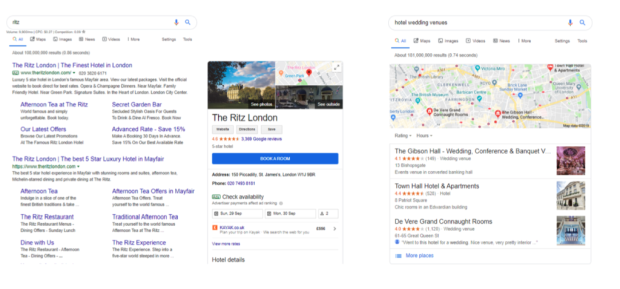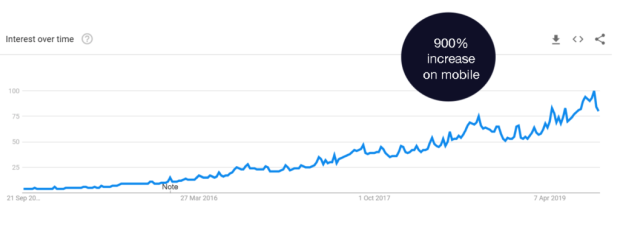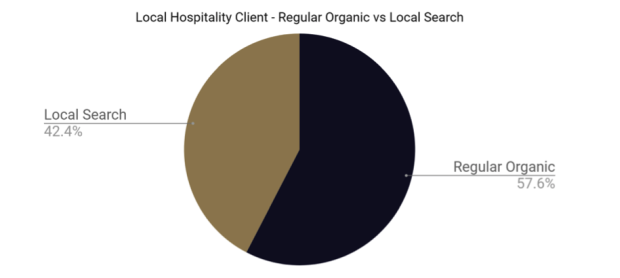
How to Optimise Your Local SEO Strategy for Luxury Hospitality Brands

When talking about SEO most businesses forget about local search opportunities. At a recent luxury case study, the team at Verb saw an increase of 42% in organic traffic due to improvements in local search strategy.
What is local SEO? Local Search Engine Optimisation is an effective way to market a local business online, as it helps businesses to promote their products and services to local customers at the exact time they are looking for them online.
There is a different set of criteria for local search vs traditional. The main difference is the focus on citations (brand mentions from elsewhere on the web) and reviews. With local SEO marketers have more resources available in order to increase the visibility of their brand and also to improve the overall user experience.
Google search
Google Maps is the centre of the local search. Today, Google is very savvy in picking up user intent by using the name of the business you are looking for, Google’s Geo location gives you personal local recommendations of the businesses that you can find around you.
The growth in local search is exemplified by the increase in “near me” searches on mobile had a 900% increase over the course of four years.
There was also a shift in consumer trust towards reviews. 72% of consumers trust online reviews as much as personal recommendations and 89% of consumers read businesses responses to reviews, therefore, having a strong emphasis on how to capture reviews from your consumers is key. From a luxury perspective, email marketing can be one of the recommended channels to use after a user has had the experience

Local SEO ranking factors
The evaluation methods and tools for ranking local SEO are different from traditional SEO as we mentioned before.

Here are six key local SEO factors from Verb team listed below:
On-site optimisation: Creating relevant content that targets particular search queries and optimising that content for search engines and users. It is important to highlight that not all good content is suitable for an organic search audience. Marketers should understand that good organic content must align with the audience’s search queries. Also, a content writer should think about SEO in the ideation stage which will help him/her to create SEO relevant blog or post.
Backlinks: The process of acquiring hyperlinks from other websites to your own. Backlinks are the top off-site ranking factor. Moreover, Google uses these links as signals to determine a website’s overall authority.
Google My Business: Google’s native tool for brick-and-mortar businesses to manage their online presence. This tool is free to claim and a cornerstone of every local SEO strategy. An account can be managed very easily by adding information, photos, posts (the same as social media posts), menus (for restaurants), reviews, venue details, bookings (for hotels), website URL and many more.
Reviews (Cross-platform reviews): In the hospitality and travel sectors, reviews can make or break a business. Verb’s studies have found a “barrier-to-entry” for the local pack of 4.0+ and the average local pack rating being 4.4+
Business Citations: Online listings and mentions of your business name, address and phone number. As well as helping users to discover a business, citations can impact local search rankings.
Social Signals (Google my Business, Facebook, Twitter, Instagram engagement)
Here are the case study results of one of our luxury clients which is a high-end restaurant in Mayfair. 42% of organic traffic came from local search over the last quarter alone.











